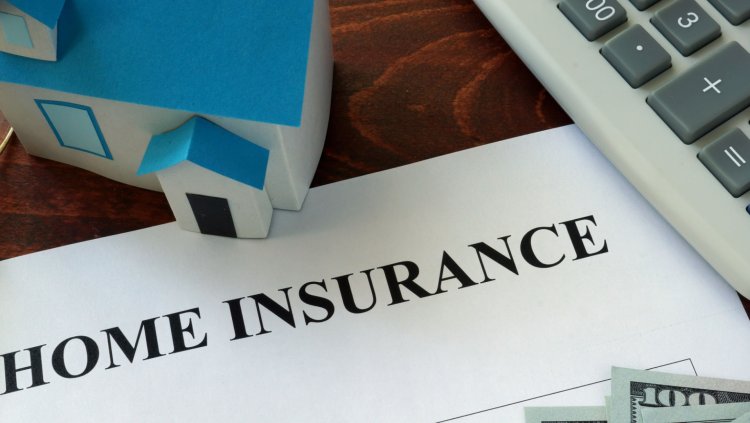Do Credit Scores Affect Home Insurance Rates?
This article delves into the ways your credit score affects home insurance rates, the reasons behind this connection, and practical tips for managing your credit to potentially lower your insurance premiums.

In the world of personal finance and home ownership, understanding the various factors that impact your expenses is crucial. One area where many homeowners may not fully grasp the connection is between credit scores and home insurance rates. Your credit score can indeed influence how much you pay for homeowners insurance, and this relationship is worth exploring in detail. This article delves into the ways your credit score affects home insurance rates, the reasons behind this connection, and practical tips for managing your credit to potentially lower your insurance premiums.
Understanding Credit Scores
Before diving into the specifics of how credit scores affect home insurance rates, it's essential to understand what a credit score is and how it is calculated. A credit score is a numerical representation of your creditworthiness, reflecting your ability to repay borrowed money. It is calculated based on various factors, including:
-
Payment History (35%): This is the most significant factor and shows whether you have paid your bills on time. Late payments, bankruptcies, and collections can negatively impact this aspect of your score.
-
Credit Utilization (30%): This measures the ratio of your current credit card balances to your credit limits. High credit utilization can lower your score, indicating potential financial strain.
-
Length of Credit History (15%): This considers how long you've had credit accounts. A longer credit history generally contributes positively to your score.
-
Types of Credit Accounts (10%): This factor evaluates the variety of credit accounts you have, such as credit cards, mortgages, and installment loans. A diverse credit mix can be beneficial.
-
Recent Credit Inquiries (10%): This looks at the number of recent credit inquiries or new credit accounts. Frequent inquiries can indicate financial distress and negatively affect your score.
The Link Between Credit Scores and Home Insurance Rates
Many people are surprised to learn that their credit score can impact their home insurance rates. Here's why insurers use credit scores in determining premiums and how this connection works:
1. Risk Assessment
Insurance companies use credit scores as part of their risk assessment process. The underlying assumption is that individuals with higher credit scores are less likely to file claims or engage in fraudulent activities. From an insurer's perspective, a higher credit score often correlates with a lower likelihood of filing a claim, which reduces their overall risk and, consequently, the premiums they charge.
2. Financial Responsibility
Your credit score reflects your financial responsibility and management skills. Insurers believe that those with higher credit scores are more likely to maintain their homes properly and take measures to prevent losses. For instance, a homeowner with a good credit score might be perceived as more responsible about regular home maintenance, which can reduce the risk of damage or loss.
3. Statistical Correlation
Studies and data analysis have shown a correlation between credit scores and insurance claims. Individuals with lower credit scores are statistically more likely to file insurance claims, which is why insurers factor credit scores into their pricing models. While this correlation does not imply causation, it serves as a predictive tool for insurers.
How Credit Scores Impact Home Insurance Rates
The impact of credit scores on home insurance rates can vary based on several factors:
1. State Regulations
Insurance regulations differ by state. In some states, insurance companies are allowed to use credit scores as a factor in determining home insurance rates, while in others, it is prohibited or limited. It's essential to understand the regulations in your state to know how much your credit score might affect your insurance premiums.
2. Insurer Policies
Different insurance companies weigh credit scores differently. While some insurers place significant emphasis on credit scores, others may use it as just one of many factors in their pricing model. It’s beneficial to compare quotes from multiple insurers to understand how your credit score might influence your rates with different companies.
3. Credit Score Bands
Insurers often categorize credit scores into bands or ranges (e.g., poor, fair, good, excellent). Your placement within these bands can significantly impact your insurance rates. Those with higher scores generally benefit from lower premiums, while those in lower bands may face higher costs.
Steps to Improve Your Credit Score
Improving your credit score can lead to better home insurance rates and overall financial benefits. Here are some steps you can take:
1. Check Your Credit Report Regularly
Regularly reviewing your credit report helps identify errors or inaccuracies that could negatively impact your score. Dispute any inaccuracies promptly to ensure your credit report reflects your true financial situation.
2. Pay Your Bills on Time
Consistent, on-time payments are crucial for maintaining a good credit score. Set up reminders or automatic payments to ensure you never miss a due date.
3. Reduce Credit Card Balances
Aim to keep your credit card balances low relative to your credit limits. High credit utilization can negatively affect your score, so paying down existing debt can improve your credit standing.
4. Avoid Opening New Credit Accounts Excessively
Each new credit inquiry can slightly lower your credit score. Only apply for new credit accounts when necessary and avoid opening multiple accounts in a short period.
5. Maintain a Healthy Credit Mix
Having a diverse mix of credit accounts, such as credit cards, installment loans, and mortgages, can positively impact your credit score. However, only take on credit that you can manage responsibly.
Practical Tips for Managing Home Insurance Costs
Besides improving your credit score, there are other strategies to manage and potentially lower your home insurance costs:
1. Shop Around for Insurance
Compare quotes from multiple insurance providers to find the best rates. Different insurers may offer varying premiums based on how they assess risk.
2. Increase Your Deductible
Opting for a higher deductible can lower your monthly premiums. Ensure that you have enough savings to cover the higher deductible in case of a claim.
3. Bundle Insurance Policies
Many insurers offer discounts for bundling multiple policies, such as home and auto insurance. This can result in significant savings on your overall insurance costs.
4. Implement Home Security Measures
Installing security systems, smoke detectors, and other safety features can reduce your risk of loss and may qualify you for discounts on your home insurance policy.
5. Review Your Coverage Regularly
Periodically review your insurance coverage to ensure it meets your current needs. Make adjustments based on changes in your home or personal circumstances to avoid paying for unnecessary coverage.
Credit scores play a significant role in determining home insurance rates, with higher scores generally leading to lower premiums. Insurance companies use credit scores as a risk assessment tool, reflecting financial responsibility and the likelihood of filing claims. Understanding this connection and taking steps to improve your credit score can help you manage and reduce your home insurance costs. Additionally, employing strategies such as shopping around, increasing deductibles, and implementing home security measures can further contribute to lowering your insurance premiums. By staying informed and proactive, you can optimize your financial well-being and protect your home effectively.
FAQs: Do Credit Scores Affect Home Insurance Rates?
1. How does my credit score impact my home insurance rates?
Your credit score affects home insurance rates because insurers use it as a factor in assessing risk. A higher credit score is often associated with a lower risk of filing claims and better financial responsibility, which can result in lower premiums. Conversely, a lower credit score may lead to higher premiums as it may indicate a higher risk of claim activity.
2. Why do insurance companies use credit scores to determine rates?
Insurance companies use credit scores to help predict the likelihood of claim filing and assess overall risk. Studies have shown a correlation between credit scores and the frequency of claims, with lower scores often associated with higher risk. By incorporating credit scores, insurers aim to set premiums that more accurately reflect the risk of insuring a particular individual.
3. Does the impact of my credit score on insurance rates vary by state?
Yes, the impact of credit scores on insurance rates can vary by state due to different regulations. Some states allow insurance companies to use credit scores in their pricing models, while others have restrictions or prohibitions. It's important to check your state’s regulations to understand how your credit score might affect your home insurance rates.
4. Can improving my credit score lower my home insurance premiums?
Yes, improving your credit score can potentially lower your home insurance premiums. Since a higher credit score is generally associated with lower risk, insurers may offer better rates to individuals with higher scores. To improve your credit score, focus on paying bills on time, reducing credit card balances, and maintaining a healthy credit history.
5. How can I check my credit score and report?
You can check your credit score and report through various online services, such as credit bureaus (Experian, Equifax, TransUnion) and financial service providers that offer free credit monitoring. It’s a good practice to review your credit report regularly for any errors or inaccuracies and to ensure that it accurately reflects your financial behavior.
6. What are some tips for improving my credit score?
To improve your credit score, consider the following tips:
- Pay your bills on time.
- Reduce credit card balances to maintain low credit utilization.
- Avoid opening multiple new credit accounts in a short period.
- Maintain a diverse mix of credit accounts.
- Regularly check and correct any inaccuracies on your credit report.
7. Do all insurance companies consider credit scores in their pricing?
No, not all insurance companies use credit scores to determine home insurance rates. While many insurers factor in credit scores, others may use different criteria or weigh credit scores less heavily. It’s beneficial to compare quotes from multiple insurers to see how they each assess risk and determine rates.
8. What other factors, besides credit scores, can affect home insurance rates?
In addition to credit scores, home insurance rates can be influenced by various factors including:
- The location and condition of your home.
- The amount of coverage you choose.
- The age and construction type of your home.
- Your claims history.
- Security features and safety measures in your home.
9. Can I lower my home insurance premiums without changing my credit score?
Yes, you can lower your home insurance premiums through other means, such as:
- Increasing your deductible.
- Bundling your home insurance with other policies, like auto insurance.
- Implementing home security measures.
- Regularly reviewing and adjusting your coverage to match your current needs.
10. How often should I review my home insurance policy?
It’s a good idea to review your home insurance policy annually or whenever significant changes occur in your life or home. Regular reviews ensure that your coverage aligns with your current needs and may help you identify opportunities for savings or necessary adjustments.
What's Your Reaction?



















